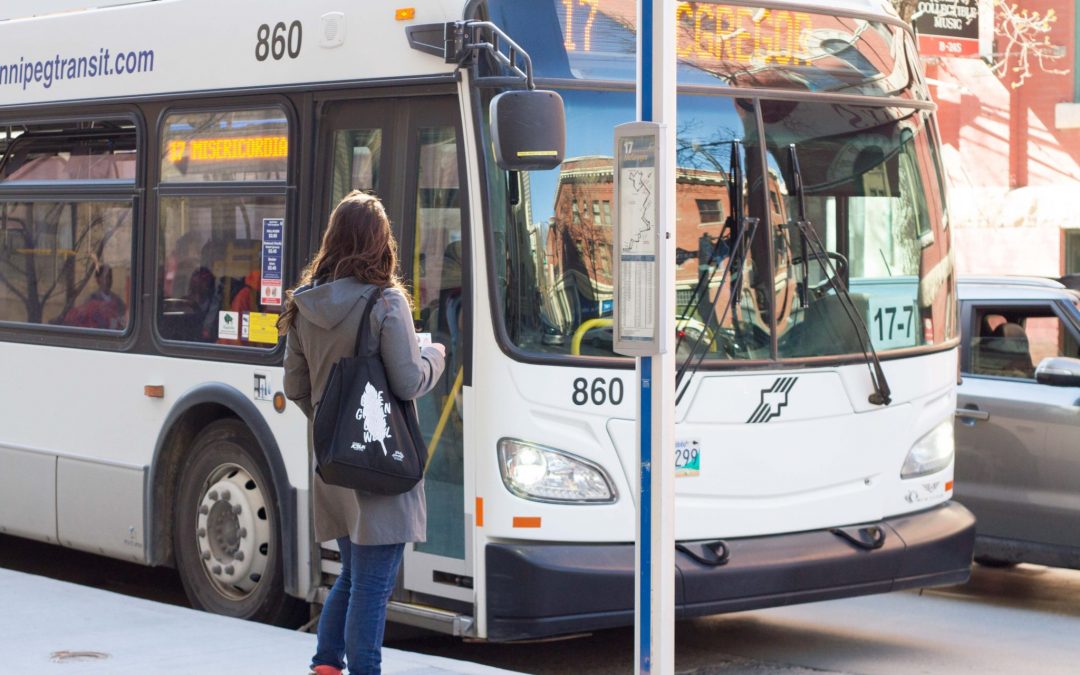At Green Action Centre, we promote greener living through environmental education, and encourage practical green solutions for homeowners, workplaces, schools and communities. We strongly encourage sustainable transportation as a way to reduce our impact on the environment and to maintain a healthy lifestyle. Public transit is a sustainable mode choice that not only helps the environment, but also proves to be beneficial for our health.
According to Climate Change Connection Manitoba, transportation is one of the largest contributors of greenhouse gas emissions in Manitoba. These greenhouse gases absorb and trap infrared radiation, heat the atmosphere, and ultimately contribute to climate change. If the majority of people individually drive to work, this results in a significant abundance of vehicles on the road, heavy traffic congestion and idling at peak times of the day.
Thankfully, these negative impacts can be reduced by simply choosing more sustainable modes of transportation. In fact, the American Public Transit Association suggests that the use of public transit saves an estimated 1.4 billion gallons of gas and 14 million tonnes of carbon dioxide annually. Winnipeg transit can fit approximately 40-50 people per bus, which reduces traffic congestion and idling, noise, greenhouse gas emissions, and air pollution.
Notably, the reduction of greenhouse gas emissions and air pollution that results from the use of more sustainable transportation options like public transit is not just good for the environment; it also improves air quality and human health. Health Canada has warned that air pollution makes it difficult for people to breathe properly and can make existing lung or heart-related symptoms worse. The World Health Organization has also linked air pollution to seven million premature deaths per year.
These negative health impacts have been found to improve with the use of sustainable transportation however. As reported by the Victoria Transport Policy Institute, people who live or work in communities with high quality public transportation tend to drive significantly less and rely more on walking, cycling and public transit. This reduces traffic collisions and emissions, while contributing to increased physical fitness and mental health. The American Heart Association has conducted research that found people who take public transit are 44% less likely to be overweight, 27% percent less likely to have high blood pressure, and 34% percent less likely to have diabetes, when compared to people who drive.
“Public transit can leave users an average of 6.5 pounds lighter and over time are 81% less likely to become obese.” *
In Winnipeg, there is much more we can do to increase our use of sustainable transportation options like public transit. According to 2011 Census data, only 3.4% of people in Winnipeg commute by public transit, whereas 78.2% of people commute by vehicle. With such high vehicle ridership and traffic congestion, commute times in Winnipeg are now the 6th longest in Canada (23 minutes) compared to 14 other major cities. A recent Time Magazine article noted that the negative health impact of such long commutes can include increased stress, elevated blood sugar, higher cholesterol, a heightened risk of depression and anxiety, decreased happiness, spikes in blood pressure, decreased cardiovascular fitness, decreased sleep quality, and back pain.
“Employees in poor health are 20% less productive than those in good health – this is comparable to a productivity reduction of one day per week.” **
The evidence clearly indicates that public transit is not only a more environmentally sustainable transportation option, but can contribute to overall improvements in our mental and physical health. If more people in car dominated cities like Winnipeg make the important choice to use public transit, walk, or cycle to work, we would have a lot less traffic congestion, shorter commutes, improved air quality, and better physical and mental health. Plus, with regular improvements to Winnipeg Transit services, there is no better time to take advantage of fast and efficient public transit options and do our part to improve the health of our environment and ourselves.

Visit our transit info page for all the information you need for your next commute by bus!
Quotes:
* Workplace Travel Training. 2012. p.5. Drivelesslivemore.com.
** Investing in Workplace Physical Activity Policies: A Business Case for Hamilton Employers. 2012. Hamilton Public Health Services.
References:
Climate Change Connection – Manitoba Transportation GHGs
Victoria Transport Policy Institute – Evaluating Public Transportation Health Benefits (PDF)
Healthline News – Healthy Commutes: Why Public Transit Is Miles Better Than Driving
Time – 10 Things Your Commute Does to Your Body
Treehugger – 3 surprising health benefits linked to public transportation




WOW! thanks for sharing your insights about this discussion. It is great to be informed
Great article and references. Thanks for your good work Green Action Centre!